The Great War Centenary
1917 - ExhibitionBoomtown - From
Front Line to White Lund
The Home Front
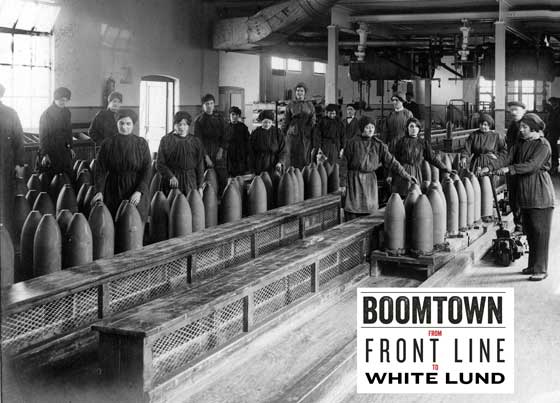
Regulation
On 8th August 1914, within four days of the outbreak of war,
parliament passed the ‘Defence of the Realm Act’ (DORA). The country now
entered a time of complete regulation. You could be prosecuted for
spreading stories that caused alarm just as much as for anti-war
feelings. Censorship of the press led, unsurprisingly, to the virtual
news blackout on such disasters as White Lund Filling Factory’s fire and
explosions. People were no longer free to fly kites, start bonfires or
buy binoculars. Such was the fear of spies signalling to Zeppelins and
other subversive activity.
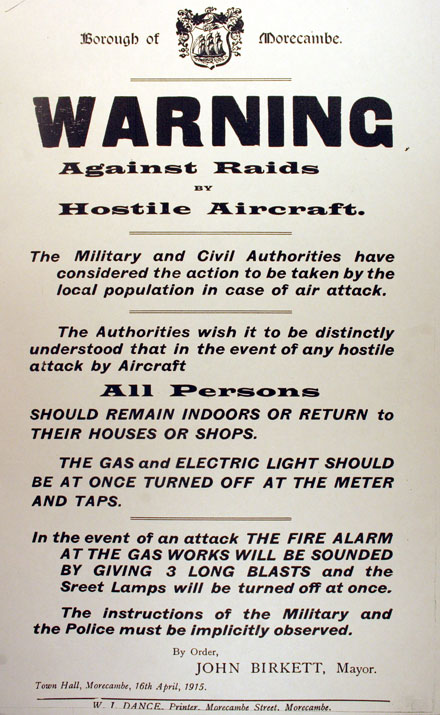
Borough of Morecambe warning of Air Raids, April 1915.
The National Registration Act meant men and women, between the ages of
15 and 65 years, had to register at their home location on 15th August
1915. Everyone had to submit their own application form and it seems
some 29 million forms were issued across England, Scotland and Wales.
They were processed locally and the information was compiled into a
central register for the Registrar General. It formed an up-to-date
record of people that could be targeted for recruitment into war work
etc. The scheme included identity cards that could be checked by the
police in cases of suspicious activity and, once conscription was
introduced in 1916, information for calling up men for the forces and
women to go to the Labour Exchange to be directed to war work.
As well as war work in local factories there were options of working in
new roles like ambulance driving, the new Women’s Land Army (1915
onwards) or even ‘on the buses’. There were some challenges for women in
this area interested in joining the Lancaster service, even though the
government had encouraged this from October 1915. It seems that women
bus conductresses in Lancaster were only permitted in 1918.
Supporting the war effort took many forms. The council allowed the City
Museum's building – the old Town Hall – to be used by the Local Branch of the
Volunteer Aid Detachment (VADs) for lectures on hospital work etc, the
Ladies Committee of a new club for soldiers’ wives as well as the
Military Authorities (who complained regularly about the state of the
heating).
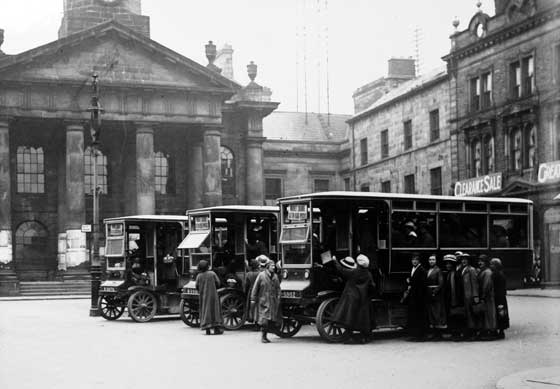
Electric battery powered buses lined up in Market Square ready to take
workers to the works on Caton Road.
Hard times: food shortages
With large numbers of men no longer working the land, enemy
‘blockades’ and un-restricted submarine warfare disrupting food and
fertiliser imports and the need to feed serving soldiers, many people
were struggling. In October 1916 the local papers reported that bread
prices were at a record level. Bakers blamed the soaring cost of flour
caused by disruption of wheat imports. Advertising posters urged people
to ‘eat less bread’.
Those that had access to land could ‘grow their own’ but in this area
much of the housing has yards rather than gardens. We are used to
hearing about parks and common land being cultivated in the Second World
War but this was seen as a solution in the First World War too. In June
1917 the Council considered letters from the Food Production Department
about cultivating part of the land opposite the Projectile Factory on
Caton Road. It is not clear if this happened.
Those that had the time queued for what food was available in shops and
poster campaigns pressed the public not to hoard food and shop keepers
not to profiteer by raising prices for any stocks they held. Government
price controls on staple foods did not solve the problem and in 1918
rationing was introduced, first in London and then across the country.
Leisure, sports and the war effort
Despite long hours on war work sports and social activities thrived.
The Projectile Factory hockey and football teams regularly used Giant
Axe Field although they did fall behind with their rents from time to
time. In March 1918, though, their Ladies’ Football Club was grant free
use for one of their matches. Sports built links with the local
community and the Projectile Factory Ladies Hockey Team is known to have
played the fairly new Lancaster Girls Grammar School.
Fundraising events and activities were organised by churches, businesses
and charitable organisations. The council regularly granted free use of
the Ashton Hall in the (new) Town Hall in Dalton Square for concerts and
socials as long as the proceeds were donated to a specific cause. The
Projectile Factory Male Voice Choir concert in February 1917 pledged one
third of their proceeds to the King’s Own Prisoner of War Fund and in
January of the following year their Workers’ Hospital Committee pledged
all the proceeds of their concert to the ‘Soldiers’ and Sailors’ Free
Buffet’ on Preston station.
Some groups held practical, activity meetings using their skills at
hand. Knitting clubs for ‘comforts for soldiers’ were popular. As well
as sending parcels off to family members ‘at the front’, the King’s Own
Prisoner of War Care Committee sent much needed food and clothing
parcels to interned prisoners.
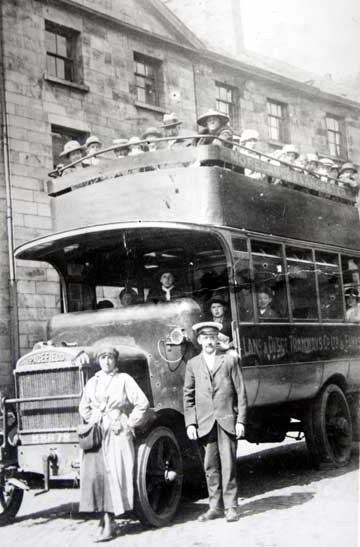
Edith Browning, one of the bus conductresses employed in Lancaster in
1918 due to the shortage of men.
Accession Number: LM2001.1
Letter from Viscount Devonport, Food Controller at
the Ministry of Food, 19th May 1917.
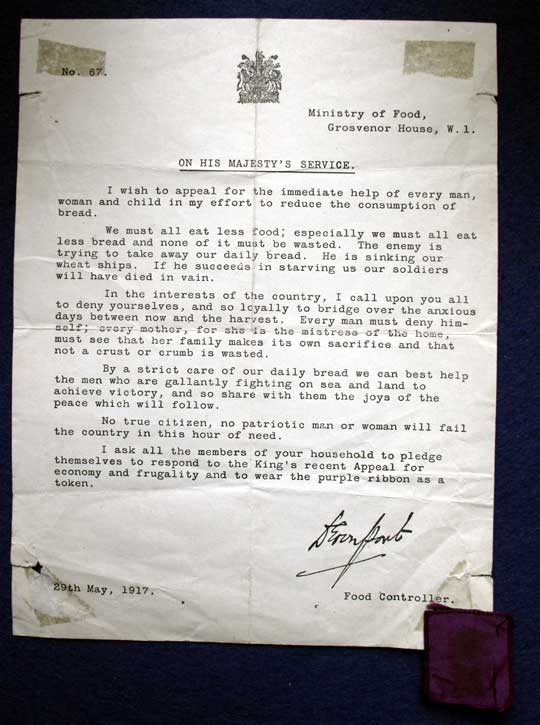
Circular from the Ministry of Food 29 May 1917. Re reduction of
consumption of bread.
Accession Number: KO0933/07
Ministry of Food
Grosvenor House W1
On His Majesty’s Service
I wish to appeal for the immediate help of every man, woman and child in
my effort to reduce the consumption of bread.
We must all eat less food; especially we must all eat less bread and
none of it must be wasted. The enemy is trying to take away our daily
bread. He is sinking out wheat ships. If he succeeds in starving us our
soldiers will have died in vain.
In the interests of the country, I call upon you all to deny yourselves,
and so loyally to bridge over the anxious days between now and the
harvest. Every man must deny himself; every mother, for she is the
mistress of the home, must see that her family makes its own sacrifice
and that not a crust or crumb is wasted.
By a strict care of our daily bread we can best help the men who are
gallantly fighting on sea and land to achieve victory, and so share with
them the joys of the peace which will follow.
No true citizen, no patriotic man or woman will fail the country in this
hour of need.
I ask all the members of your household to pledge themselves to respond
to the King’s a recent Appeal for economy and frugality and to wear the
purple ribbon as a token.
[Viscount] Devonport
Food Controller
29th May 1917
Accession Number: KO0933/07
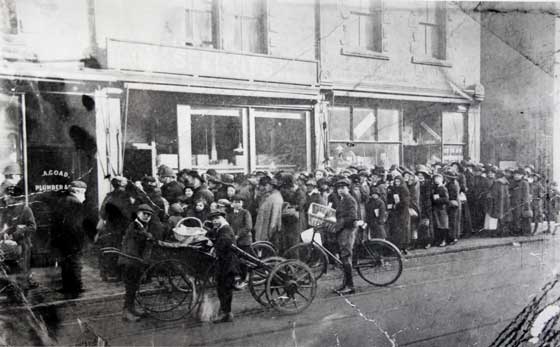
Food queue at Speight’s Grocers, Brock Street, Lancaster
LM98.3
© Images are copyright, Trustees of the King's Own Royal Regiment Museum.
You must seek permission prior to
publication of any of our images.
Only a proportion of our collections
are on display at anyone time. Certain items are on loan for display
in other institutions. An appointment is required to consult any of
our collections which are held in store.







